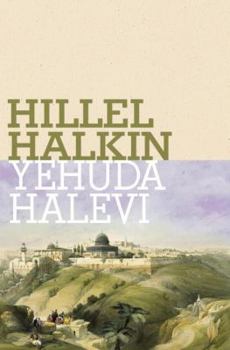Yehuda Halevi
Select Format
Select Condition 
Book Overview
Part of the Jewish Encounter series A masterly biography of Yehuda Halevi, one of the greatest of Hebrew poets and a shining example of the synthesis of religion and culture that defined the golden... This description may be from another edition of this product.
Format:Hardcover
Language:English
ISBN:0805242066
ISBN13:9780805242065
Release Date:February 2010
Publisher:Schocken Books Inc
Length:353 Pages
Weight:1.07 lbs.
Dimensions:1.3" x 5.6" x 7.8"
Customer Reviews
1 rating
This is an excellent introduction to a famous Jewish poet and his Kuzari
Published by Thriftbooks.com User , 14 years ago
The twelfth century Spanish poet Yehuda Halevi was well-respected during his lifetime, but is better known today for his poetical defense of Judaism called The Kuzari, a book that is admired by so many Jews that numerous rabbis give classes and lectures on it, as if it is a holy book. Unfortunately, neither these rabbis nor their congregants delve deeply enough into the volume to understand it, as Halkin does. Hillel Halkin, an expert on Hebrew literature, is an excellent choice to write about Halevi. Halkin states that very little is known about Halevi's personal life, including when he was born and died, who he married and about his children. The noun "Halevi" was not his name; it was applied to all Jews who are Levites, putative descendant of Jacob's son Levi, and means "The Levite." Virtually all that is known about him is drawn from brief often somewhat obscure personal references contained in his poems and some letters, including letters found in 1896 in the Cairo Genizah in Egypt. We know that he was not only a successful poet, but also a physician with a medical practice; but he wrote that he did not like being a doctor and felt that he was not good at it. Halkin spends most of his book discussing Halevi's poetry. He gives many examples of Halevi's non-religious poems on wine, women, and song (such as, "O swear by Love that you remember days of embraces / As I remember nights crammed with your kisses"), his religious poems, and his poems about Israel, including his famous poem, whose opening words Halkin translates as, "My heart in the east, but the rest of me far in the west." The well-known line of the famous Israeli song of the 1967 war "Jerusalem of gold, of copper, and of light, / To all your songs I am a lute" was taken from Halevi's "Zion! Do You Wonder?" Halkin analyses many of the poems and shows how they are constructed. Readers will learn much about poetry from these discussions. Halkin also writes about Spain during Halevi's lifetime, and this will interest people who want to know about this unusual, often turbulent period of Jewish history, the time and place when and where Judaism's greatest philosopher Moses Maimonides (1138-1204) was born. But, Halevi's present-day renown is based on his Kuzari, a fictional account of a rabbi explaining Judaism to a non-Jewish Kuzar king. Halevi subtitled his Kuzari "The Book of Proof and Demonstration in Defense of the Despised Faith." Like his negative opinion about his medical practice, Halevi repudiated his Kuzari in a letter as "foolishness." Halkin suggests that Halevi may have been referring to an early version of this classic, but this is by no means certain because many of the ideas that Halevi offers his readers are difficult if not impossible to accept. Halevi argues in a circular fashion, for example, that Judaism is not based on faith but on historical experience. We know, he insists, that there were six hundred thousand Israelites at Sinai because the Bible tells us




